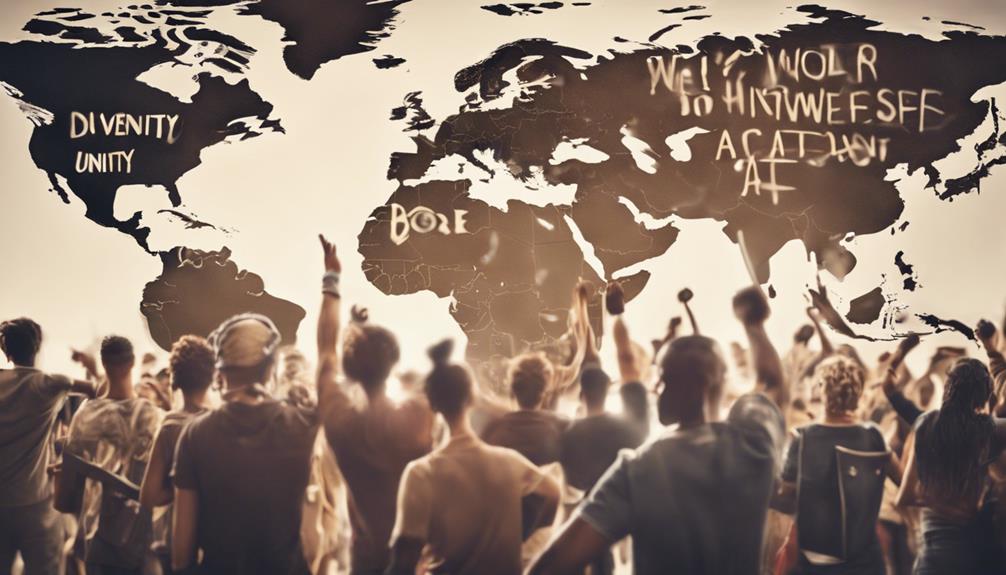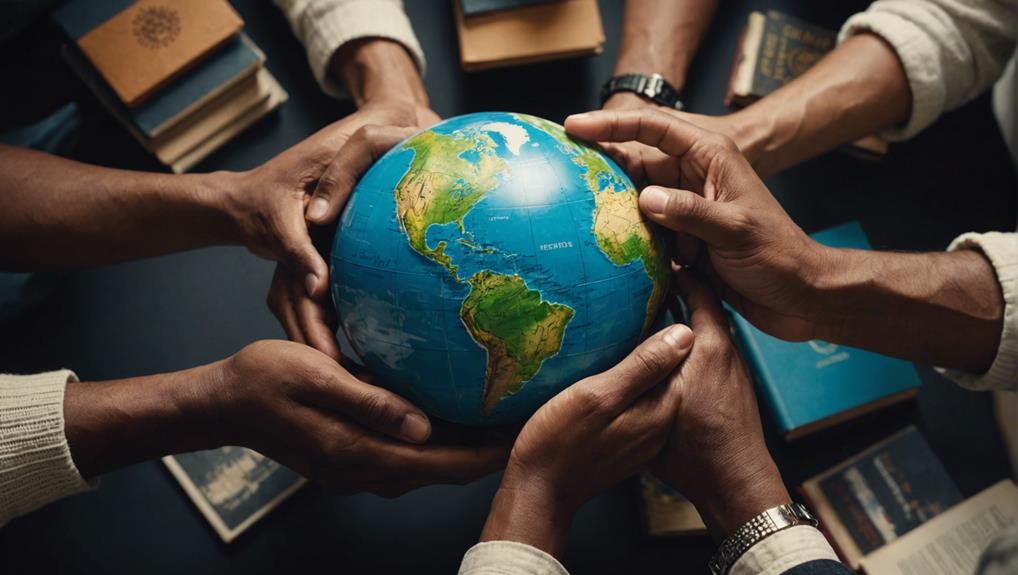Discover non-fiction books that delve into pressing global issues like education, social injustice, gender equality, political turmoil, environmental sustainability, economic disparities, racial discrimination, technological advancements, and health crises. Immerse yourself in narratives of empowerment, activism, and advocacy to gain insights into potential solutions for these complex challenges. Explore the pivotal role of education in overcoming adversity, the need for systemic change to address injustice, and the importance of equitable policies and ethical practices. Uncover a wealth of knowledge that sheds light on the complexities of contemporary global issues and offers pathways to meaningful change.
Global Education and Empowerment
Exploring global education and empowerment uncovers narratives of resilience, advocacy, and transformation in various non-fiction works.
The stories of empowered women in these works highlight the pivotal role education plays in overcoming adversity. In 'Three Cups of Tea,' Greg Mortenson's mission to build schools promotes peace through education, demonstrating the power of learning in fostering understanding and unity.
Malala Yousafzai's 'I Am Malala' showcases a young girl's unwavering courage in standing up for education, surviving a brutal attack by the Taliban. Her story exemplifies the transformative impact education can have on individuals and societies, especially in the face of oppression.
'Half the Sky' by Nicholas D. Kristof focuses on turning oppression into opportunities for women globally, emphasizing the importance of empowering women through education to create a more equitable world. These narratives underscore the profound influence education has in empowering women and reshaping communities for the better.
Social Injustice and Activism
You'll find powerful narratives in books like 'The Hate U Give' and 'Between the World and Me' that illuminate the struggles faced by marginalized communities.
These works challenge you to confront issues of racism, police brutality, and systemic injustice in society.
Activism for Change
When addressing social injustice and activism, it's crucial to tackle systemic issues directly and advocate for meaningful change. Books like 'The Hate U Give' and 'Between the World and Me' shed light on systemic racism, exposing the challenges faced by individuals due to their skin color. These narratives challenge readers to acknowledge the realities of racial inequality and work towards a more just society.
'White Fragility' and 'Hood Feminism' explore the complexities of racism and the intersectionality of poverty, urging individuals to recognize their privilege and actively combat discrimination. Additionally, 'Just Mercy' calls for criminal justice reform, emphasizing the need to address inequalities within the legal system. Through these works, authors inspire readers to take action and advocate for a more equitable world.
Impact of Injustice
To understand the impact of social injustice and activism, one must recognize the systemic discrimination and power imbalances that fuel inequalities based on race, gender, and socioeconomic status.
In the United States, racial injustice remains a significant issue, with communities of color disproportionately affected by discriminatory practices in areas such as law enforcement, education, and healthcare. Activism plays an essential role in addressing these disparities, with movements like Black Lives Matter advocating for systemic change and raising awareness about racial discrimination.
Gender Equality and Women's Rights

Gender inequality persists globally, with women earning 77 cents for every dollar earned by men on average. Despite advancements in women's rights, challenges remain. Women are still underrepresented in leadership roles, holding only 29% of senior management positions worldwide.
Additionally, violence against women continues to be a prevalent issue, with 1 in 3 women experiencing physical or sexual violence in their lifetime. Access to education is another hurdle, as 130 million girls are out of school due to various barriers.
However, women's rights movements have achieved significant milestones in areas such as reproductive rights, workplace equality, and political representation. By continuing to address these issues and advocate for gender equality, progress can be made towards a more equitable society.
Reading non-fiction books on contemporary global issues related to gender equality and women's rights can provide valuable insights into the ongoing struggles and successes in this important field.
Political Turmoil and Diplomacy
You need to comprehend the intricate dynamics of political turmoil and diplomacy to grasp the crisis in governance and global diplomatic relations. Understanding how these elements intersect is vital for navigating the complexities of international affairs and fostering cooperation among nations.
Crisis in Governance
Political turmoil grips nations worldwide, as internal conflicts and governance challenges escalate, testing diplomatic relations and global stability. Issues such as global poverty and governance crises have become prevalent, exacerbating tensions within and between countries.
Major powers like the US, China, and Russia are at odds, straining international cooperation. The UK's struggle with Brexit and the emergence of populist movements in Europe further underscore the fragility of traditional governance systems.
International organizations, particularly the United Nations, play a pivotal role in mediating conflicts and fostering diplomacy during times of crisis. Corruption, opacity, and human rights abuses are recurring themes in governance crises globally, challenging the very foundations of effective governance and exacerbating the turmoil in various regions.
Global Diplomatic Relations
Amidst the escalating governance challenges and internal conflicts worldwide, the landscape of global diplomatic relations is increasingly important in maneuvering political turmoil and fostering international cooperation. Diplomatic efforts play a significant role in resolving conflicts, building alliances, and addressing global challenges through negotiation and dialogue.
Formal communication channels, treaties, summits, and embassies are essential components of diplomatic relations that facilitate international interactions. When political turmoil arises, skilled diplomats are needed to navigate complex situations and maintain peace to prevent conflicts and promote mutual interests among nations.
Effective diplomacy is key to preventing escalations, fostering peace, and advancing cooperation in the world today. For insightful perspectives on these global dynamics, consider exploring non-fiction books on global diplomatic relations.
Environmental Sustainability Challenges

Global environmental sustainability faces critical challenges as carbon dioxide levels soar, deforestation rates escalate, and plastic pollution devastates ecosystems worldwide. The impacts of climate change are exacerbating the frequency and intensity of extreme weather events, affecting communities and ecosystems. This poses a significant threat to vulnerable populations living in extreme poverty, who often lack resources to cope with environmental disasters.
The degradation of natural habitats due to deforestation not only endangers countless species but also disrupts essential ecosystem services that support human livelihoods. In addition, the proliferation of plastic waste in oceans is endangering marine life and entering the food chain, posing risks to human health.
Addressing these environmental sustainability challenges requires urgent global cooperation and innovative solutions. From reducing carbon emissions and promoting reforestation efforts to implementing policies that curb plastic use and improve waste management, concerted efforts are needed to safeguard the planet's ecosystems for future generations. By addressing climate change and environmental degradation, we can work towards a more sustainable future for all.
Economic Disparities and Poverty
As environmental sustainability faces critical challenges, economic disparities and poverty exacerbate hardships for over 700 million people worldwide struggling to meet basic needs. The ramifications of these issues are far-reaching, impacting various aspects of individuals' lives. Here are some key points to keep in mind:
- New Jim Crow: The concept of the New Jim Crow highlights how economic disparities intersect with racial discrimination, leading to disproportionate rates of poverty among marginalized communities.
- Poverty and Profit: The pursuit of profit often comes at the expense of those living in poverty, perpetuating cycles of economic inequality and exploitation in many parts of the world.
- Systemic Injustice: Addressing economic disparities and poverty requires recognizing and dismantling the systemic injustices that contribute to these challenges, advocating for equitable policies and redistributive measures to create a more just society.
Understanding the intricate connections between economic disparities, poverty, and systemic injustices is important in developing effective strategies to combat these pressing global issues.
Racial Discrimination and Equity

Racial discrimination pervades societies worldwide, impacting marginalized communities across all facets of their lives. In cities like New York, where diversity is celebrated, systemic injustices still prevail, hindering the progress and well-being of people of color.
Equity initiatives have emerged as a response to these disparities, aiming to dismantle ingrained biases and promote inclusivity. Through awareness campaigns and educational programs, advocates work to challenge institutionalized racism and create a more just society.
Collaborative efforts involving individuals, organizations, and policymakers are essential in fostering real change and addressing the root causes of racial discrimination. By championing diversity and advocating for equity, communities can work towards a future where all individuals are treated fairly and have equal access to opportunities.
It's through these concerted actions that progress towards a more equitable society can be achieved, ensuring a brighter and more inclusive future for generations to come.
Technological Advancements and Ethics
In exploring the world of technological advancements and ethics, one must grapple with the intricate balance between innovation and moral implications. The development of artificial intelligence (AI) brings forth a myriad of ethical dilemmas that require careful consideration.
- Jeanette Winterson's 'Frankissstein' examines the ethical dilemmas surrounding AI development and synthetic biology, challenging societal norms and perceptions.
- Toby Ord emphasizes the risks associated with unaligned artificial intelligence, highlighting the pressing need for responsible AI governance to guarantee ethical practices.
- 'Frankissstein' by Winterson explores the boundaries of life creation and the ethical implications of corporate control over AI technology, shedding light on the potential consequences of unchecked technological advancement.
Navigating the complex landscape of AI development and ethics is paramount in addressing the potential challenges and ensuring that innovation is aligned with ethical principles for the betterment of society.
Health Crisis and Pandemics

Managing the complexities of addressing health crises and pandemics requires a coordinated global effort and proactive measures to safeguard public health and economic stability. The new health crisis landscape, exemplified by the challenges posed by COVID-19, has underscored the importance of robust healthcare systems, equitable vaccine distribution, and global solidarity.
Vaccination campaigns have played a pivotal role in combating pandemics, emphasizing the need for international collaboration and fair access to vaccines. Additionally, the emergence of new infectious diseases necessitates continuous surveillance, preparedness, and swift responses to prevent future pandemics.
The resilience of health systems has been put to the test, highlighting the significance of investing in healthcare infrastructure and skilled healthcare professionals. Pandemics have revealed the intricate interconnectedness between health and socio-economic factors, urging holistic approaches to address public health crises effectively.
To navigate the evolving landscape of health crises and pandemics, proactive global strategies and collective action remain imperative.
Conclusion
You've just scratched the surface of the vital issues facing our world today. These non-fiction books offer a window into the complex challenges we must confront.
From global education to environmental sustainability, these books provide valuable insights and perspectives.
So delve into, expand your knowledge, and be prepared to have your mind blown by the eye-opening truths within these pages.
The world is truly at your fingertips with these powerful reads!




